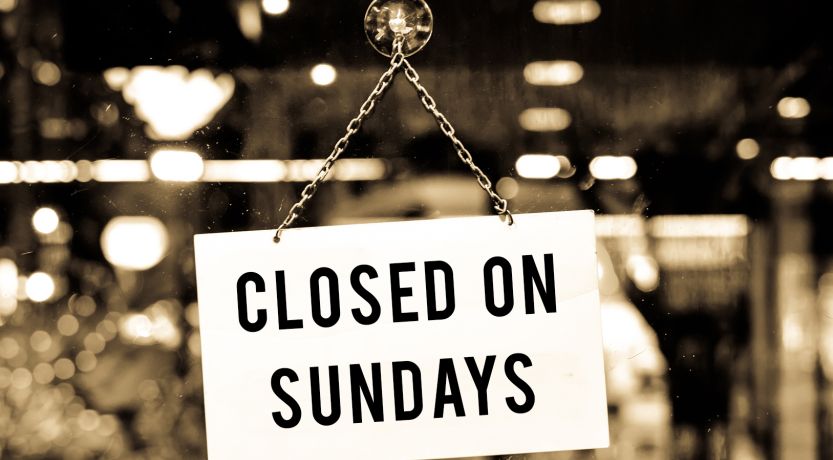Why the Push for European Sunday Laws?
Groups within Europe are pushing for laws to prevent work on Sundays. Could this seemingly harmless idea have prophetic implications?

For over a year, the Polish parliament has been discussing a proposed law requiring businesses to close on Sundays. In late November, lawmakers in the lower house approved the bill, which will now be sent to the Polish senate and president—who are also expected to approve it. Before the vote, a group of Catholic bishops released a statement directed toward the parliament in support of the law.
Sunday laws (sometimes disguised in laws governing working hours called “Working Time Directive”) are being pushed throughout EU nations. Proponents of these laws suggest they make workers’ lives better, improve public health and foster a better environment for families. Consider the recent history of the push for Sunday as an enforced day of rest:
- November 2016: EU bishops call for recognition of Sunday as a common day of rest for workers.
- June 2015: Pope Francis issued the encyclical “Laudato Si’: On Care for Our Common Home,” suggesting a Sunday rest is needed for the care and well-being of our planet.
- July 2014: The pope lamented Sunday being used for business and not for families and friendships.
- December 2009: Germany’s Constitutional Court enforced Sunday as a day of rest and “spiritual elevation” by overturning a Berlin law that eased restrictions on Sunday shopping.
- February 2009: The EU Parliament declared a work-free Sunday as “an essential pillar” of Europe and called for all EU member states to protect Sunday. The Catholic, Protestant and Anglican churches later released a joint statement welcoming the declaration.
For students of Bible prophecy, the push for Sunday as a legislated day of rest in Europe comes as no surprise.
Two groups of people
The Bible prophesies that a political system led by a strong leader, prophetically called “the beast,” will rise to power in Europe (Revelation 13:1). This will be a final revival of the Roman Empire and will enforce a false system of worship led by a religious leader called the “false prophet.” This system will “blaspheme” God and “make war with the saints” (Revelation 13:6-7).
Following “the beast” and receiving his mark are connected with disobedience to God—the opposite of keeping God’s commandments.
The saints are identified as those who “keep the commandments of God and the faith of Jesus” (Revelation 14:12). This includes the Fourth Commandment, the seventh-day Sabbath.
Those who follow “the beast” and receive “his mark” will be punished (Revelation 14:9-10). Following “the beast” and receiving his mark are connected with disobedience to God—the opposite of keeping God’s commandments (Ephesians 5:6; Revelation 16:11).
This sets up the fundamental issue people will face in the end time: Whom will you obey? The saints follow God and keep His commandments, while most people are deceived and instead follow a false system of worship characterized by disobedience to God’s law.
The beast’s mark vs. God’s sign
The Bible shows this mysterious “mark of the beast” will be part of a great deception in the end time. But what exactly is this mark? Many have speculated that it is something physical placed on or inside the body—such as an implanted microchip, a tattoo or a credit card. Let’s examine the clues the Bible gives us about this mark:
- It will affect the entire world—“all, both small and great, rich and poor, free and slave” (Revelation 13:16).
- Without it, people cannot perform such basic economic functions as buying or selling (Revelation 13:17).
- It’s related to a form of “worship” (Revelation 13:15).
- It’s associated with the right hand or forehead (Revelation 13:16).
- Those who receive it will experience God’s wrath (Revelation 14:9-10; 16:2). Since microchips or credit cards are not prohibited in God’s law, it wouldn’t make sense that God would be angered by their use.
- Faithful Christians will keep the Sabbath as an identifying sign they are God’s people (Exodus 31:13-16; Ezekiel 20:20-21).
- They will have God’s law in their hearts, meaning that God’s laws are “as a sign” on their hands and “as frontlets” between their eyes (Deuteronomy 6:1-8).
- God’s wrath is against those who reject His law—therefore His blessing is on those who observe it (Deuteronomy 11:16-18).
Notice the connection between the beast’s “mark” and the “sign” of God’s people. Both the mark of the beast and sign of God’s law are described as being on the hand and forehead. This seems to be an example of the Bible’s use of symbolic language. The hand represents the source of action—what we do. The forehead represents the mind—what we think and where our heart is.
The saints have the sign of obedience by keeping God’s law in thought and in action (Revelation 14:12). The wicked follow another system that teaches the opposite.
Sabbath vs. Sunday
Watch the Roman Catholic Church and its growing influence in Europe. As it gains more power, we will likely see a greater push for enforced Sunday observance and other unbiblical practices.
You can guard yourself against accepting this future mark by embracing the sign of obedience to God.
Date Posted: December 5, 2017



